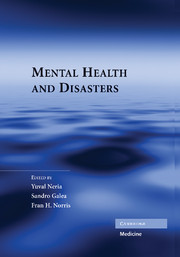Book contents
- Mental Health and Disasters
- Dedication
- Mental Health and Disasters
- Copyright page
- Contents
- Acknowledgments
- Contributors
- 1 Disaster Mental Health Research:
- Part One Concepts
- Part Two Psychopathology After Disasters
- Part Three Vulnerability And Resilience
- Part Four Special Groups
- Part Five Interventions And Health Services
- Part Six Case Studies
- 23 The Mental Health Impact of the Southeast Asia Tsunami
- 24 Advances in Our Understanding of Earthquake Trauma and Its Treatment:
- 25 Hurricane Katrina
- 26 The Long-Term Mental Health Impacts of the Chernobyl Accident
- 27 TheExxon ValdezOil Spill
- 28 Enschede Fireworks Disaster
- 29 Eyewitness to Mass Murder:
- 30 The Oklahoma City Bombing
- 31 The Terrorist Attacks of September 11, 2001, in New York City
- 32 The Psychological Consequences of the London Bombings
- 33 Psychological Responses to Terrorism in Israel: 2000–2004
- Part Seven Questions and Directions
- Index
32 - The Psychological Consequences of the London Bombings
from Part Six - Case Studies
Published online by Cambridge University Press: 07 May 2010
- Mental Health and Disasters
- Dedication
- Mental Health and Disasters
- Copyright page
- Contents
- Acknowledgments
- Contributors
- 1 Disaster Mental Health Research:
- Part One Concepts
- Part Two Psychopathology After Disasters
- Part Three Vulnerability And Resilience
- Part Four Special Groups
- Part Five Interventions And Health Services
- Part Six Case Studies
- 23 The Mental Health Impact of the Southeast Asia Tsunami
- 24 Advances in Our Understanding of Earthquake Trauma and Its Treatment:
- 25 Hurricane Katrina
- 26 The Long-Term Mental Health Impacts of the Chernobyl Accident
- 27 TheExxon ValdezOil Spill
- 28 Enschede Fireworks Disaster
- 29 Eyewitness to Mass Murder:
- 30 The Oklahoma City Bombing
- 31 The Terrorist Attacks of September 11, 2001, in New York City
- 32 The Psychological Consequences of the London Bombings
- 33 Psychological Responses to Terrorism in Israel: 2000–2004
- Part Seven Questions and Directions
- Index
Summary
Keywords
- Type
- Chapter
- Information
- Mental Health and Disasters , pp. 538 - 557Publisher: Cambridge University PressPrint publication year: 2009
- 3
- Cited by

